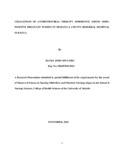| dc.contributor.author | Kiama, John M | |
| dc.date.accessioned | 2019-01-21T08:27:37Z | |
| dc.date.available | 2019-01-21T08:27:37Z | |
| dc.date.issued | 2018 | |
| dc.identifier.uri | http://hdl.handle.net/11295/105162 | |
| dc.description.abstract | Background: Adherence of or more than 95% to Antiretroviral Therapy (ART) has been highly regarded as a success in HIV treatment. Globally, there are various challenges associated with ART adherence among sero-positive pregnant women especially in sub-Saharan Africa. In Kenya, there is inadequate information on challenges of ART adherence among sero-positive pregnant women.
Objective: To establish the challenges that influence ART adherence among sero-positive pregnant women in Murang’a county referral Hospital’s MCH
Methodology: The research design was analytical cross-sectional design with a retrospective review of ANC records. The research study utilized both quantitative and qualitative methods of data collection using interviewer administered questionnaire for the sero-positive pregnant women and in-depth interview for the key informants. The sample size was 57 sero-positive pregnant women who were sampled using census method. Quantitative data cleaning and entry was done manually into MS-Excel spreadsheet and analysis done using Statistical Package for Social Sciences (SPSS) Program. Significance level of 95% was used to determine the strength of the association between variables. Qualitative data was analyzed using NVIVO 8 software.
Results: Viral load results and pill counts results revealed that sero-positive pregnant women adhered to ART regimen until the viral load dropped to less than 50 copies of HIV. Challenges of ART adherence among sero-positive pregnant women were as follows:
The literacy levels’ influence on ART adherence among the sero-positive pregnant women was significant in the following aspects; low education level (p=0.01), poor knowledge on condom use (p=0.004), selective disclosure (p=0.003), poor compliance to ART prescription (p=0.002)
and clients having a sense of full recovery (p=0.009). Cultural related factors that posed as challenges to ART adherence included; faith healing (p=0.037) and stigma (p= 0.0010). Hospital related factors included; under-staffing (p=0.001), drug side effects (p= 0.031), lack of enough space in the hospital (p=0.001) and unclear instructions to patients (p=0.009). The patient related factors found to influence ART adherence were: alcoholism (AOR=5; CI=3.8-7.0; p=0.004), forgetfulness AOR=5; CI=5.0-5.1; p=0.002), lack of family support (AOR=3; CI=3.0-5.1; p=0.037) and depression (AOR=2; CI=1.9-4.1; p=0.018).
Conclusion: There exists other clients’ related challenges that affect ART adherence in addition to literacy related challenges, cultural related challenges and hospital related challenges.
Recommendations: There is need to strengthen the health education given to sero-positive pregnant women to optimize the adherence level, destigmatize the patient status as well as the medication they are on. | en_US |
| dc.language.iso | en | en_US |
| dc.publisher | University of Nairobi | en_US |
| dc.rights | Attribution-NonCommercial-NoDerivs 3.0 United States | * |
| dc.rights.uri | http://creativecommons.org/licenses/by-nc-nd/3.0/us/ | * |
| dc.title | Challenges of Antiretroviral Therapy Adherence Among Sero-positive Pregnant Women in Murang’a County Referral Hospital in Kenya | en_US |
| dc.type | Thesis | en_US |
| dc.description.department | a
Department of Psychiatry, University of Nairobi, ; bDepartment of Mental Health, School of Medicine,
Moi University, Eldoret, Kenya | |



